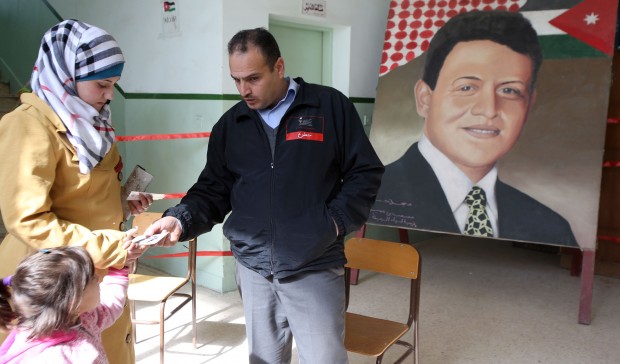
Jordanians vote in the parliamentary elections on 23 January 2013 in the city of Zarqa, Jordan as a portrait of King Abdullah II looks on. Source: Jordan Pix/Getty Images
The recent elections in Jordan, held amidst a boycott by the main opposition parties, have fuelled talk of a missed opportunity. The argument goes that a toothless parliament, composed mostly of loyalists elected by an unfair electoral system, will be unlikely to provide a legal and democratic channel for dissent, leaving the opposition no option but to resort to the street.
Indeed, recent protests over price hikes have led some observers to speculate that Jordanians have grown wary of the king and are, like their neighbors to the north, ready for an uprising. Others concede that a full-blown uprising is unlikely, but that sweeping political reforms are urgently needed to avoid serious instability in the future. The side that advocates reform has, by and large, dominated the debate on Jordan.
But does King Abdullah II really need to reform so quickly and so deeply? A little-publicized incident from the northern town of Ramtha suggests that he can afford to take his time. In November 2011, twenty-year-old taxi driver Najm Al-Azayza was arrested by Jordanian military police on suspicion of smuggling arms across the nearby border with Syria. After four days in custody, the family of the young man were informed that he had “hung himself,” and were instructed to collect his body from the local mortuary. What followed was a riot that saw the Amman–Damascus highway closed and a police station and municipality building burned to the ground. The clan to which the young man belonged demanded justice, accusing the authorities of torturing their son to death.
What followed could so easily have been a re-run of events in Dera’a, Syria. Eight months earlier, similar circumstances in that city involving police brutality resulted in a nationwide uprising that continues to this day. Instead, Awn Al-Khasawna, then prime minister of Jordan, intervened and ordered an immediate investigation by the country’s chief coroner. When that failed to pacify the townsmen, it fell to King Abdullah II to settle the matter in person. The officer accused of the torture was arrested, compensation was promised and calm restored to the town.
While acts of royal magnanimity alone may not be enough to stave off future internal instability, they do underscore a number of key lessons that Jordan watchers will be wise to take on board. The first is that whatever mistakes agents of the state commit in their dealings with ordinary people, in Jordan the king is still seen as the ultimate guarantor of justice. That, in a clan-based society, is hugely important in affirming his legitimacy to rule over the kingdom.
The second is that the government has grown accustomed to handling outbursts of popular anger. Because Jordan is not a repressive state, and because the security forces there tend to tread lightly when compared to their neighboring counterparts, demonstrations and calls for reform are nothing new. At times, disturbances have resulted in real and immediate reforms, such as during the April 1989 food riots that led to the resumption of parliamentary politics. Most of the time, protests do not end in fatalities and local grievances are settled within the community through civil society networks. The moderation of the Jordanian political system helps to prevent sparks turning into fires.
Jordanian monarchs are not stubbornly resistant to change, but they are resistant to change where significant challenges to their authority exist. Given the civil war in Syria, the rise of the Muslim Brotherhood in Egypt, and growing instability in Iraq, it would seem uncharacteristically enterprising for the Jordanian monarch to embark on a program of deep political reform at this time.
King Abdullah II can take heart from the fact that the demands of recent protests have been mainly economic, and that the Islamist-dominated opposition remains weak and splintered. Despite high fuel prices, the Jordanian middle class does not object to subsidy reform as long as it is offset by greater inward investment. There is still some ground to cover in the war against high-level corruption, but with the conviction last year of the former head of the intelligence directorate, it appears that a serious start has been made. The impression in Amman is that the king will deliver reform at a pace congruous with wider developments in the region, but at least he is listening.
